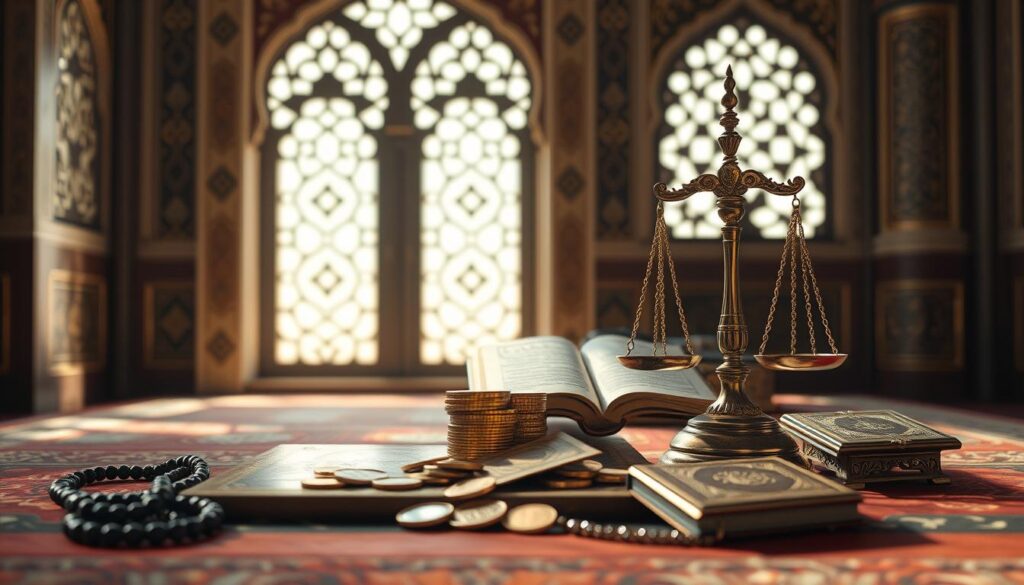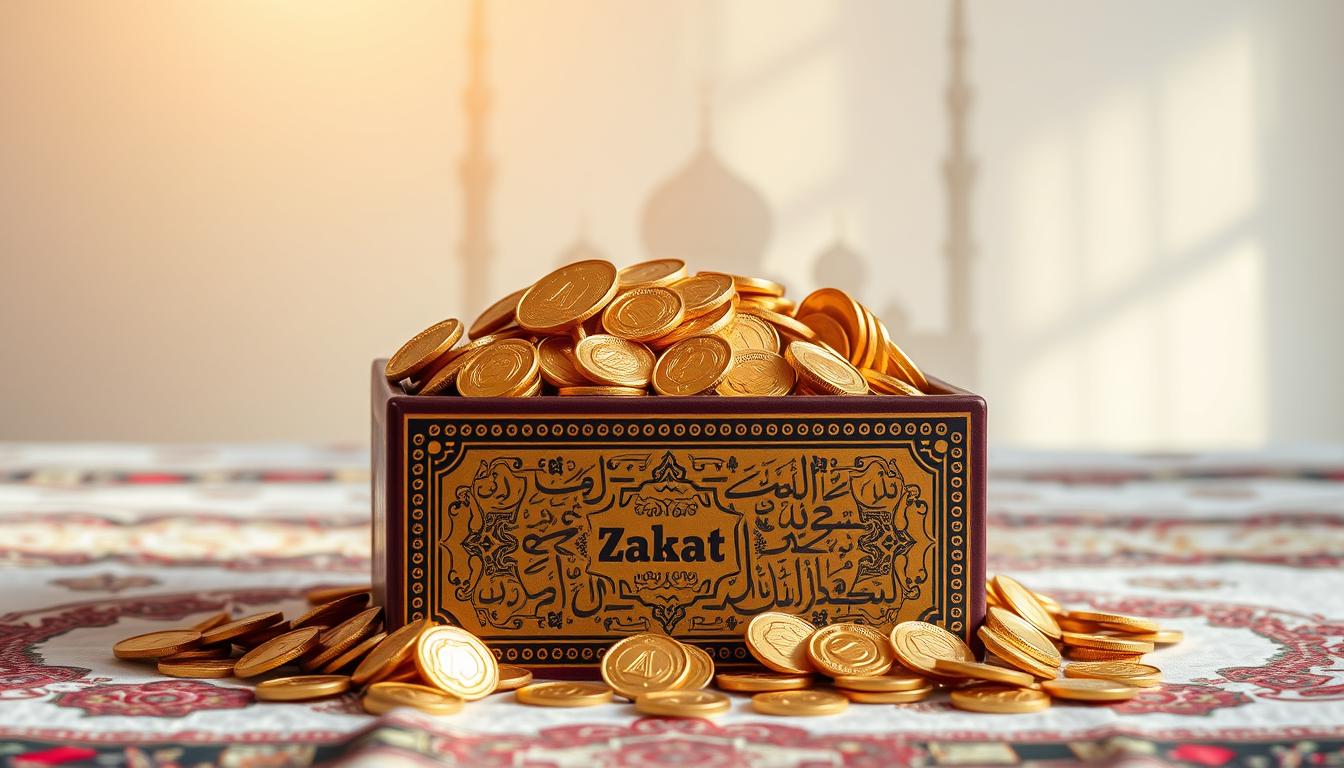A surprising statistic shows that if the ten wealthiest individuals paid Zakat, it could help a lot. This shows how important it is to pay Zakat on time. We will look at when to pay Zakat, who can, and how to calculate it, including the Nisab threshold.
Join us at Umar Khan Charity Organization to change lives with timely Zakat payments. Call us at +256742603101, email [email protected], or visit www.umarkhancharity.org. Learn about Zakat’s role in helping those in need and how to calculate it.
Key Takeaways
- Understanding the Nisab threshold is key for knowing when to pay Zakat.
- Zakat calculation means giving 2.5% of your total wealth that can be given.
- Timely Zakat payments can greatly help reduce poverty.
- Zakat is a must for all adult, sane Muslims with more than the Nisab threshold.
- Zakat al-Mal and Zakat al-Fitr are different, with their own times for payment.
- Recipients can choose where Zakat goes, like Civic Engagement or Youth Empowerment.
Understanding Zakat: An Overview
At Umar Khan Charity Organization, we see Zakat as a powerful tool to change lives. We want you to learn about Zakat and its role in Islam. Zakat is a key part of Islam, one of the Five Pillars that Muslims must follow. It’s a charity that cleanses a Muslim’s wealth by giving some to those who need it.
To grasp Zakat eligibility, remember Zakat is more than charity. It’s a spiritual duty that cleanses wealth and helps those in need. The Zakat due date is usually once a year, and Zakat obligations depend on the type and value of wealth.
Some important Zakat facts are:
- Zakat is given on different types of wealth at a 2.5% rate after a year.
- There are eight groups that Zakat helps, including the poor and those in debt.
- Zakat cleanses the believer’s soul and wealth.
We’ll explore Zakat further, including its meaning, importance, and who can give it. This will help you meet your Zakat obligations and help your community.
Who is Obligated to Pay Zakat?
Understanding who must pay Zakat is key to our Islamic duties. A Muslim must have wealth over a certain amount, called Nisab, to pay Zakat. The Nisab is about 87.48 grams of gold or 612.36 grams of silver.
Here are the groups that must pay Zakat:
- Those with wealth over the Nisab
- Those who have owned wealth for a whole year
- Those who control their wealth alone
Zakat rules differ slightly by school of thought. Yet, the main idea stays the same. We invite you to join Umar Khan Charity Organization to learn more about Zakat.
The Nisab is a key part of Zakat rules. It’s important to know how to calculate it. By following Zakat rules and understanding Nisab, we can meet our duties and help our communities.
At Umar Khan Charity Organization, we help people understand and fulfill their Zakat duties. We believe together, we can change lives for the better.
| Category | Description |
|---|---|
| Poor | Those unable to meet life essentials without modesty |
| Indigent | Those who must ask for help due to dire need |
| Zakat workers | Those who collect and distribute Zakat |
Different Types of Zakat
At Umar Khan Charity Organization, we stress the importance of timely Zakat payments. We encourage you to learn about the different Zakats and their role in Islam. Zakat al-Fitr and Zakat al-Mal are the two main types. Zakat al-Fitr is given by the household head for each family member. Zakat al-Mal is given on wealth over a certain amount.
Zakat charity is key in Islam, and knowing the types is vital. Zakat al-Fitr is a charity given at Ramadan’s end, costing as much as a meal. Zakat al-Mal, on the other hand, is 2.5% of one’s wealth and is required when one’s wealth reaches a certain level.
Zakat al-Fitr and Zakat al-Mal Calculation
Calculating Zakat al-Fitr and Zakat al-Mal is simple. Zakat al-Fitr is 2.5 kg or 3.5 liters of rice per person. Zakat al-Mal is 2.5% of total assets. In DKI Jakarta, Zakat Fitrah is IDR 40,000 per person. Zakat Mal is needed for those with assets over IDR 100 million for a year.
When thinking about our Zakat financial year, remember Zakat is more than money. It’s a way to help our community. By knowing how to calculate Zakat, we can give back efficiently and effectively.
| Type of Zakat | Calculation | Threshold |
|---|---|---|
| Zakat al-Fitr | 2.5 kg or 3.5 liters of rice per person | No threshold |
| Zakat al-Mal | 2.5% of net wealth | Nisab threshold (IDR 100 million) |
When Should Zakat Be Paid?
Understanding when to pay Zakat is key to fulfilling this Islamic duty. Zakat is usually paid once a year, known as a Hawl. To figure out when, we need to know our wealth and assets, and the Nisab threshold.
Annual Calculation
Every year, we check our assets and debts to find out how much Zakat we owe. We can use online Zakat calculators or talk to a financial advisor. For more details, visit Zakat.org.
Specific Events and Circumstances
Some events can change when we need to pay Zakat. For instance, if we get new assets or our wealth grows a lot, we might need to recalculate. By following the rules and keeping an eye on our finances, we can meet our Islamic duty on time.
We invite you to join Umar Khan Charity Organization in making a difference with Zakat. Contact us to find out how you can help and support our mission to change lives through faith-based humanitarian work.
The Lunar Calendar and Zakat
At Umar Khan Charity Organization, we see the lunar calendar as key for Zakat payments. It tells us when Zakat is due, with Ramadan being very important. To figure out Zakat, first find your Nisab threshold, the minimum wealth needed. The Zakat calculation then looks at your assets and debts to find out how much Zakat you owe.
Relationship with Ramadan
Ramadan is a month for more charity and kindness. Many Muslims pay their Zakat then. The Zakat calculation is vital to ensure the right amount is given. Important things to remember when paying Zakat in Ramadan include:
- Paying Zakat on time to avoid sin and keep wealth pure
- Calculating Zakat based on Nisab threshold and total wealth
- Understanding the lunar calendar and Ramadan’s role in Zakat
Other Significant Months
Months like Shawwal also matter for Zakat payments. Shawwal is seen as a time for new starts. Knowing the lunar calendar helps pay Zakat on time and right. The Nisab threshold and Zakat calculation are key to figuring out how much to give.
How to Calculate Zakat
Calculating Zakat can seem hard, but with the right help, it’s easier. First, you need to know the Zakat guidelines and Zakat payment rules. Zakat is 2.5% of extra wealth, taken from savings and assets not used for daily needs.
Here’s how to figure out Zakat:
- Check your assets and debts
- Find out your Nisab, which is 612.36 grams of silver or 87.48 grams of gold
- Figure out 2.5% of your extra wealth
Zakat should be paid every year. Using an Online Zakat Calculator can make it simpler. By following these Zakat guidelines and Zakat payment rules, you can pay Zakat correctly and easily.

At Umar Khan Charity Organization, we welcome you to join us. Learn more about Zakat calculation. Contact us to find out how you can help those in need.
| Category | Description |
|---|---|
| Zakat Recipients | The poor, the needy, administrators, those reconciled to faith, freeing slaves, aiding debtors, God’s cause, and travelers in need |
| Zakat Payment | 2.5% of surplus wealth, deducted from savings and financial assets not allocated for living expenses |
Methods of Payment for Zakat
At Umar Khan Charity Organization, we make paying Zakat easy. We offer various payment methods, like local and international donations, and in-kind contributions. This way, donors can pick what works best for them, making it simpler to give Zakat.
For Zakat charity distribution, picking the right way to help is key. Donors can give locally or internationally, based on their wishes and the causes they support. Giving items like food, clothes, or other essentials is also a great way to help.
Understanding the Zakat financial year is important. Donors can pay Zakat monthly or yearly, based on their budget and wishes. This ensures their donations help consistently throughout the year.
- Increased convenience and accessibility for donors
- More effective Zakat charity distribution and allocation of resources
- Greater transparency and accountability in the donation process
Choosing a reliable organization like Umar Khan Charity ensures your Zakat is used well. It helps those in need effectively.
The Role of Charity Organizations
We understand how important charity organizations are in Zakat distribution. They make sure funds get to those who need them most. It’s key to pick organizations that follow Islamic rules and Zakat guidelines closely.
At Umar Khan Charity Organization, we’re all about helping with Zakat distribution. We also give Zakat payment rules advice to our community. Our goal is to help everyone get the basics they need and to inspire people to give back.
When picking a charity, consider these things:
- They should be open about how they work and spend money.
- They must stick to Islamic values and Zakat guidelines.
- They should give out funds well and to those who really need it.
By teaming up with good charity groups, we can really help those in need. We make sure our Zakat payment rules are followed right, as Islam teaches us.
Transformative Impact of Timely Zakat
At Umar Khan Charity Organization, we see the big change that timely Zakat payments bring. We want you to see how Zakat can change lives. Zakat payments help people and communities, giving them support and power.
Zakat charity distribution is key in the Zakat financial year. It makes sure funds go to those who need them most. Zakat’s power to change lives is huge, helping communities grow and develop over time. Here are some examples:
- Reducing poverty rates by 7.5% in Pakistan through systematic Zakat distribution
- Lowering poverty rates by 5.5% in Indonesia through productive Zakat programs
- Driving financial inclusion and macroeconomic stability in Saudi Arabia through increased Zakat contributions
We aim to make a big difference with Zakat charity distribution. It’s important to pool funds, focus on local efforts, and balance spending. This way, Zakat can have its greatest impact, changing lives for the better.
Common Questions about Zakat Timing
Many ask about the best time to pay Zakat. Is it better to give early or late? Knowing the Zakat due date and rules is key to making good choices. The Zakat due date is usually the same each year, based on the lunar calendar.
It’s wise to pay Zakat as soon as you can after the due date. This ensures timely payment and meets your obligation. Some choose to pay in Ramadan, seeing it as a blessed time for giving.
Here are important points for Zakat payment timing:
* The Zakat due date is the same each year, based on the lunar calendar.
* Paying Zakat as soon as possible is recommended.
* Ramadan is a good time to pay Zakat, but it’s not the only option.
* The main goal is to pay on time and fulfill your duty.
Understanding Zakat due dates and rules helps make informed payment decisions. Join our community at Umar Khan Charity Organization to learn more about Zakat timing. Contact us to find out more.
| Zakat Payment Option | Description |
|---|---|
| Paying on the due date | Paying Zakat on the same date each year, based on the lunar calendar. |
| Paying during Ramadan | Paying Zakat during the month of Ramadan, considered a blessed time for giving. |
Encouraging Zakat Among the Community
At Umar Khan Charity Organization, we believe in the power of Zakat. We see it as key to a better society. By following Zakat guidelines and rules, people can help those in need a lot.
Strategies for Raising Awareness
To get more people to give Zakat, we need to spread the word. Here are some ways to do that:
- Organizing community events and workshops to educate people about Zakat guidelines and Zakat payment rules
- Using social media platforms to share information and resources about Zakat
- Collaborating with local mosques and Islamic centers to promote Zakat and provide opportunities for people to give
Community Events and Education
Community events and education are key to Zakat success. Together, we can build a culture of giving. Here are some event ideas:
- Charity fundraisers and auctions
- Food drives and clothing collections
- Volunteer opportunities and community service projects
Get Involved with Umar Khan Charity
At Umar Khan Charity, we invite you to join us in making a lasting impact. We distributeZakat to help those in need. As a trustedZakat charity, we offer many ways for you to get involved.
Whether you want to volunteer or stay updated on our work, we welcome you. Our team works hard to make sure yourZakat financial yearhelps those who need it most.
By joining Umar Khan Charity, you become part of a caring community. We work on projects like food aid, education, and emergency relief. Our goal is to bring about real change and inspire hope.
Visit our website, follow us on social media, and sign up for our newsletters. This way, you’ll stay updated on our work and volunteer chances. Together, we can change lives, guided by Islam and our shared goal of helping others.
Connect with us today and start a journey of Zakat-driven change.






